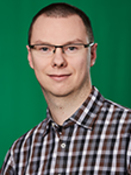
M. Sc. Markus Lemmer
- Wissenschaftlicher Mitarbeiter
- Tel.: +49 721 9654-153
- lemmer ∂does-not-exist.fzi de
FZI Forschungszentrum Informatik
Embedded Systems and Sensors Engineering (ESS)
Haid-und-Neu Str. 10-14
76131 Karlsruhe
Lebenslauf
Markus Lemmer studierte Elektro- und Informationstechnik am Karlsruher Institut für Technologie (KIT) mit dem Schwertpunkt Regelungs- und Steuerungssysteme. Die Vertiefungsrichtungen seines Studiums lagen in den Bereichen Regelungstechnik und elektrische Antriebe. Während des Studiums praktische Tätigkeit in der Vorentwicklung der Siemens AG. Seine Masterarbeit mit dem Titel "Entwurf und Analyse zeitdiskreter Linear-Quadratischer Zwei-Spieler-Folgeregelungen" schrieb er am Institut für Regelungs- und Steuerungssysteme (IRS).
Seit Oktober 2018 ist er als wissenschaftlicher Mitarbeiter am FZI im Bereich Embedded Systems and Sensors Engineering (ESS) tätig.
Forschung
Entwicklung von Fahrermodellen für Kreuzungsszenarien
Eine wesentliche Herausforderung bei der Einführung hoch-automatisierter Fahrzeuge ist deren Validierung. Während für die Validierung herkömmlicher Fahrzeuge im Wesentlichen Testfahrten eingesetzt werden, ist dies für hoch-automatisierte Fahrzeuge aufgrund des erhöhten Testaufwandes weder praktikabel noch ökonomisch ist.
Eine Alternative zur Validierung mittels Testfahrten ist die Verwendung einer Simulationsumgebung. Wesentliche Bestandteile einer solchen Simulationsumgebung sind, Modelle für das Verhalten anderer Verkehrsteilnehmer, welche die Interaktion von Fahrern mit anderen Verkehrsteilnehmern korrekt abbilden.
Daher, soll ein spieltheoretisches Simulationsmodell für das Verhalten von Fahrern in einem innerstädtischen Kreuzungsszenario entwickelt werden, welches das interaktive Verhalten mit anderen Verkehrsteilnehmern abbildet.
Publikationen
Lemmer, M.; Schwab, S.; Hohmann, S.
2023, September 7. 18th DortmunderAutoTag (2023), Dortmund, Deutschland, 7. September 2023
Lemmer, M.; Schwab, S.; Hohmann, S.
2023. at - Automatisierungstechnik, 71 (1), 16–27. doi:10.1515/auto-2022-0097
Lemmer, M.; Schwab, S.; Hohmann, S.
2022. 2022 IEEE Conference on Control Technology and Applications (CCTA), 857–862, Institute of Electrical and Electronics Engineers (IEEE). doi:10.1109/CCTA49430.2022.9966194
Schwab, S.; Hohmann, S.; Lemmer, M.
2022, Juni 23. 17. Fachtagung Entwurf Komplexer Automatisierungssysteme (EKA 2022), Magdeburg, Deutschland, 23.–24. Juni 2022
Lemmer, M.; Shu, J.; Schwab, S.; Hohmann, S.
2021. 2021 IEEE International Conference on Systems, Man, and Cybernetics (SMC), Melbourne, Australia, 17-20 Oct. 2021, 1332–1338, Institute of Electrical and Electronics Engineers (IEEE). doi:10.1109/SMC52423.2021.9658771
Lemmer, M.; Schwab, S.; Hohmann, S.
2021. IEEE Conference on Control Technology and Applications (CCTA), San Diego, CA, USA, 9-11 Aug. 2021, 416–423, Institute of Electrical and Electronics Engineers (IEEE). doi:10.1109/CCTA48906.2021.9658588
Varga, B.; Inga, J.; Lemmer, M.; Hohmann, S.
2021. Proceedings of the IEEE CCTA 2021 : 5th IEEE Conference on Control Technology and Applications, 728–734, Institute of Electrical and Electronics Engineers (IEEE). doi:10.1109/CCTA48906.2021.9658788
Lemmer, M.; Schwab, S.; Hohmann, S.
2020. 2020 IEEE International Conference on Systems, Man, and Cybernetics (SMC), 2269–2276, Institute of Electrical and Electronics Engineers (IEEE). doi:10.1109/SMC42975.2020.9283079
Varga, B.; Shahirpour, A.; Lemmer, M.; Schwab, S.; Hohmann, S.
2020. 2020 IEEE International Conference on Systems, Man, and Cybernetics (SMC), Toronto, ON, Canada, October 11–14, 2020., Art.-Nr. 09283367, Institute of Electrical and Electronics Engineers (IEEE). doi:10.1109/SMC42975.2020.9283367
Lemmer, M.; Köpf, F.; Schwab, S.; Flad, M.; Hohmann, S.
2018. 1st IEEE International Conference on Artificial Intelligence and Knowledge Engineering, AIKE 2018; Laguna Hills; United States; 26 September 2018 through 28 September 2018, 156–161, Institute of Electrical and Electronics Engineers (IEEE). doi:10.1109/AIKE.2018.00034

